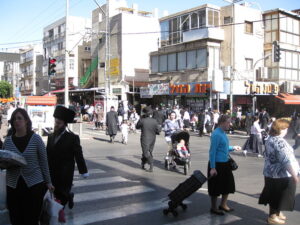CAMERA’s Israel office yesterday prompted correction of an NBC article which grossly inflated the number of novel coronavirus infections suspected among residents of Bnei Brak, an ultra-Orthodox suburb of Tel Aviv. The April 23 digital article, “New coronavirus cases halved in Israeli ultra-Orthodox city after military lockdown,” erroneously reported that Israeli health officials feared that one-third of the population of the ultra-Orthodox Israeli town of Bnei Brak was infected with covid-19.
Not all residents of Bnei Brak heeded the government’s instructions to stay home, resulting in the rapid spread of the virus earlier this month, and leading health experts to fear as many as a third of the population of about 200,000 could be infected. (Emphasis added.)
 As CAMERA has previously reported, the apparent source for that refuted figure is the CEO of the Maccabi HMO, Dr. Ran Saar. Significantly, the Maccabi researchers responsible for the model that came up with that number rechecked the data alongside Health Ministry officials, and have disavowed the figure.
As CAMERA has previously reported, the apparent source for that refuted figure is the CEO of the Maccabi HMO, Dr. Ran Saar. Significantly, the Maccabi researchers responsible for the model that came up with that number rechecked the data alongside Health Ministry officials, and have disavowed the figure.
The CEO of Maccabi health services, Ran Saar, said today (Thursday) that according to various indications, some 38 percent of B’nei Brak residents are sick with coronavirus – in other words, about 75,000 people. Until now, 900 have been diagnosed. Haaretz reported this week that approximately one-third of those tested in B’nei Brak were sick.
Nevertheless, a recheck carried by the Health Ministry together with the Maccabi officials who had built the model revealed an apparent miscalculation. Thirty-five percent of the tests in Maccabi’s testing station in the city did indeed come out positive, but most of those tested were those who showed early symptoms of the disease. Thus, the number of sick in the city extraordinarily exceeds the national average, but is very far from the number that Saar cited. It is likely that the actual number is one-tenth of the figure that was cited.
CAMERA’s BBC Watch prompted followingcorrection April 9 after the BBC reported that a senior health official said nearly 40 percent of Bnei Brak’s population was infected:
Correction 9 April 2020: This article has been amended to include an assertion that the claim by the Maccabi health service official about the likely infection rate in Bnei Brak was based on an erroneous calculation.
 In response to communication from CAMERA, NBC promptly and commendably amended the article, which currently states that health experts feared that “thousands” of people may be infected in Bnei Brak. Moreover, the following correction is appended to the bottom of the article:
In response to communication from CAMERA, NBC promptly and commendably amended the article, which currently states that health experts feared that “thousands” of people may be infected in Bnei Brak. Moreover, the following correction is appended to the bottom of the article:CORRECTION (April 26, 2020, 2 p.m. ET): An earlier version of this article included an out-of-date estimate from health officials on the proportion of Bnei Brak residents infected with the coronavirus. Health officials originally said that as much as a third of the population was probably infected; by the time of the article’s publication, that estimate had been lowered to one-tenth of that amount. The earlier estimate has been removed from the article.

